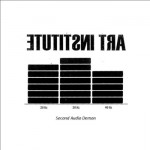Art Institute, Second Audio Demon

There’s an oddly back-of-the-bar vibe to Art Institute’s Second Audio Demon; by that I mean that it comes off like it’s music that’s meant for the crowd of twenty or so afficionados gathered in the dimly-lit space rather than the partiers up front getting loaded on cheap beer. It’s not quick or easy music to get into, in spite of the conventional guitar-bass-drums trio setup — it’s easy to imagine half-drunk bar patrons stumbling into the room and wondering what they hell they’ve gotten into before escaping in a panic.
As fits the Demon in the EP title, the band’s second-ever release treads darker, murkier ground than the first — the guitars and rhythms are far more restrained than on First in a series of audio demonstrations, at least to my ears, and for that they somehow manage to be more menacing. First track “The New Math” is a case in point, all moody guitar, synths, rain sounds, and soft-footed bass underneath Paul Chavez’s dispassionate, almost Brit-punk-sounding vocals; it sounds like it could very well have stepped, fully-formed, off of some long-lost Rough Trade comp from back in the early ’80s.
“New Color of Mourning” treads similar ground, with a deliberate, relentless drumbeat and monotone-yet-vicious vocals that call to mind New Model Army’s “Inheritance,” although the space-age, half-distorted keys and nearly funky bassline serve to shift things around a bit. The track’s still damn bleak, though, even with that shifting-around — it’s difficult not to twitch a little bit to a song with a line like “Your suicide is not enough,” especially when delivered so flat and matter-of-factly. The anger’s there, but it’s burned down to a bitter, whitehot coal of hatred, and that’s pretty terrifying to see/hear.
The Art Institute guys head in much more of a math-rock direction with “Lord Jim,” which steps neatly sideways from the post-New Wave-isms and into the Minutemen/Jonx realm, complete with stuttering, off-time guitars, call-and-response yelled vocals about industry and belonging, and busy, complex drumming that sounds continually like it’s just about to collapse in a heap but never quite trips itself up (and yes, that’s a cool thing).
“Twenty Six Hundred” is lower-key, with an awesomely crunchy, halfway-DIY guitar sound that reminds me of the days of my youth where I used to literally sit right in front of a beaten-up old amp and try to coax the most distorted, messy-sounding power chords out of the single speaker. The electronic drums click and clack like a kid beating a metal garbage can, sure, but hell, it works.
Then there’s the extra, unlabeled track at the end, where the band cuts loose somewhat and suddenly sounds more like they did on First; it’s frantic, desperate, and angular, funky in a Gang of Four sense of the word, and the whole thing’s relentless in spite of Chavez being almost completely unintelligible. To the Art Institute guys’ credit, though, the song feels less like a tacked-on addition and more like something they actually meant to include but forgot to list in the track listings. For being an afterthought, it’s surprisingly compelling — I want to hear it live and in person.
This is the sound of punk from back before somebody decided it had to have raw, over-distorted guitars and lots of yelling to be called “punk” — from back when “punk” was more about questioning and making something original than it was about any particular sound. Think the early days of Rough Trade or SST, when the bands weren’t yet locked into punk stereotypes but were open to do whatever the hell they wanted. Here’s to hoping more and more bands find their way back to that mindset.



[…] that was cool — from what I heard, I think they were mostly playing more recent stuff off of Second Audio Demon, which seems a little less all-out punk and more pre-punk, at least to me. These guys are obviously […]
[…] second EP those Art Institute guys sent me a little while back, btw, and have reviewed it right up here — it’s definitely different from that first scrappy, raw-sounding demo (although it […]